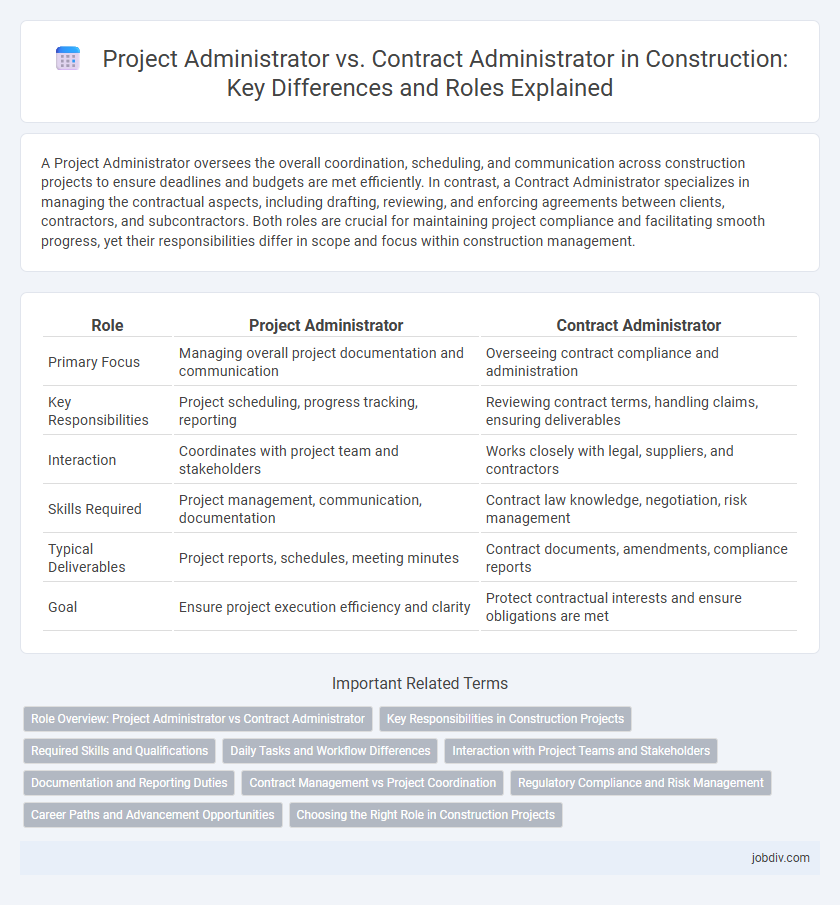A Project Administrator oversees the overall coordination, scheduling, and communication across construction projects to ensure deadlines and budgets are met efficiently. In contrast, a Contract Administrator specializes in managing the contractual aspects, including drafting, reviewing, and enforcing agreements between clients, contractors, and subcontractors. Both roles are crucial for maintaining project compliance and facilitating smooth progress, yet their responsibilities differ in scope and focus within construction management.
Table of Comparison
| Role | Project Administrator | Contract Administrator |
|---|---|---|
| Primary Focus | Managing overall project documentation and communication | Overseeing contract compliance and administration |
| Key Responsibilities | Project scheduling, progress tracking, reporting | Reviewing contract terms, handling claims, ensuring deliverables |
| Interaction | Coordinates with project team and stakeholders | Works closely with legal, suppliers, and contractors |
| Skills Required | Project management, communication, documentation | Contract law knowledge, negotiation, risk management |
| Typical Deliverables | Project reports, schedules, meeting minutes | Contract documents, amendments, compliance reports |
| Goal | Ensure project execution efficiency and clarity | Protect contractual interests and ensure obligations are met |
Role Overview: Project Administrator vs Contract Administrator
A Project Administrator oversees the overall coordination of construction projects, managing schedules, resources, and communication between teams to ensure timely completion. A Contract Administrator specializes in managing contract documents, compliance, and changes, ensuring all contractual obligations are met and disputes are minimized. Both roles require strong organizational skills but focus on different aspects of project execution and legal documentation.
Key Responsibilities in Construction Projects
Project Administrators in construction manage overall project documentation, schedule coordination, and stakeholder communication to ensure timely completion. Contract Administrators focus on preparing, reviewing, and managing contract documents, compliance, and resolving contractual disputes. Both roles require strong organizational skills but emphasize differing aspects: project execution versus contract compliance.
Required Skills and Qualifications
Project Administrators in construction require strong organizational skills, proficiency in project management software, and a thorough understanding of construction timelines and budgeting. Contract Administrators must possess expertise in contract law, negotiation abilities, meticulous attention to detail, and knowledge of regulatory compliance. Both roles benefit from excellent communication skills, but Contract Administrators typically need more legal and financial acumen.
Daily Tasks and Workflow Differences
Project Administrators coordinate overall project schedules, resource allocation, and communication among stakeholders to ensure timely progress and budget adherence. Contract Administrators manage contract documentation, track compliance with terms and conditions, and handle risk mitigation related to contractual obligations. The daily workflow of Project Administrators centers on project execution and team collaboration, while Contract Administrators focus on legal compliance, contract modifications, and dispute resolution.
Interaction with Project Teams and Stakeholders
Project Administrators coordinate daily operations, ensuring that project teams communicate effectively and adhere to schedules, while Contract Administrators focus on managing contractual obligations, addressing compliance issues, and liaising with stakeholders to resolve disputes. Both roles require collaboration with engineers, contractors, and clients to align project deliverables with contractual terms and deadlines. Effective interaction facilitated by these administrators supports risk mitigation, improves workflow transparency, and enhances stakeholder satisfaction throughout the construction lifecycle.
Documentation and Reporting Duties
Project Administrators manage comprehensive documentation including project plans, schedules, and progress reports to ensure overall project alignment and communication among stakeholders. Contract Administrators focus on maintaining and organizing contract documents, tracking compliance, amendments, and correspondence to mitigate risks and ensure contractual obligations are met. Precise documentation and timely reporting by both roles are critical for project control, dispute resolution, and successful construction delivery.
Contract Management vs Project Coordination
A Contract Administrator in construction focuses on contract management by ensuring compliance with contractual terms, managing changes, and handling disputes to protect stakeholder interests. A Project Administrator emphasizes project coordination, overseeing schedules, resource allocation, and communication among teams to maintain workflow efficiency. Effective contract management reduces legal risks while strong project coordination enhances on-time, on-budget project delivery.
Regulatory Compliance and Risk Management
Project Administrators coordinate overall construction activities ensuring adherence to building codes and safety regulations, minimizing regulatory risks throughout project execution. Contract Administrators manage contractual obligations, monitor compliance with legal terms, and mitigate risks related to scope changes, delays, and claims. Both roles are critical in managing regulatory compliance and risk, but Project Administrators focus on operational alignment while Contract Administrators emphasize legal and contractual safeguards.
Career Paths and Advancement Opportunities
Project Administrators in construction often advance by gaining hands-on experience managing project schedules, budgets, and team coordination, eventually moving into roles such as Project Manager or Construction Manager. Contract Administrators typically progress by deepening expertise in contract law, procurement, and risk management, leading to positions like Contract Manager or Procurement Director. Both career paths offer opportunities for specialization and leadership roles, with Project Administrators focusing more on operational oversight and Contract Administrators on legal and financial compliance.
Choosing the Right Role in Construction Projects
Choosing between a Project Administrator and a Contract Administrator in construction projects depends on the scope and complexity of responsibilities. A Project Administrator manages overall project coordination, scheduling, and communication, ensuring deadlines and budgets are met, while a Contract Administrator focuses on drafting, negotiating, and managing contract terms and compliance with legal and financial obligations. Selecting the right role enhances project efficiency, risk management, and stakeholder satisfaction by aligning administrative tasks with project requirements.
Project Administrator vs Contract Administrator Infographic

 jobdiv.com
jobdiv.com